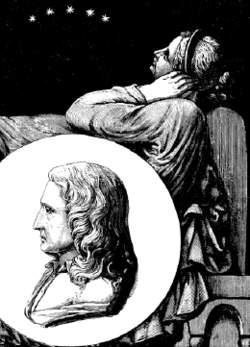Newton, Sir Isaac
(religion, spiritualism, and occult)Sir Isaac Newton, the scientist famous for formulating the law of universal gravitation, was born January 5, 1642, in Woolsthorpe, Lincolnshire, England, and died on March 31, 1727, in Kensington, England. He was highly regarded in his time, much as Albert Einstein later was. Newton’s study of Johannes Kepler’s third law of motion led him to theorize that the gravitational attraction between Earth and the Moon—and, by extension, the gravitational attraction between all bodies—is inversely proportional to the square of the distance between them. This law of universal gravitation was put forth in his Principia Mathematica (1687). Newton is credited with many other achievements, such as the invention of calculus.
As a young man studying mathematics, Newton also studied astrology. An often-repeated, though probably apocryphal tale, is that the astronomer Edmond Halley kidded Newton about his interest in astrology. Newton, it is said, defended himself by asserting, “I have studied the subject, Mr. Halley, and you have not.” In any event, Newton never recanted his belief in astrology, nor did he ever imply that the new science he and his contemporaries were creating invalidated astrology in any way.
